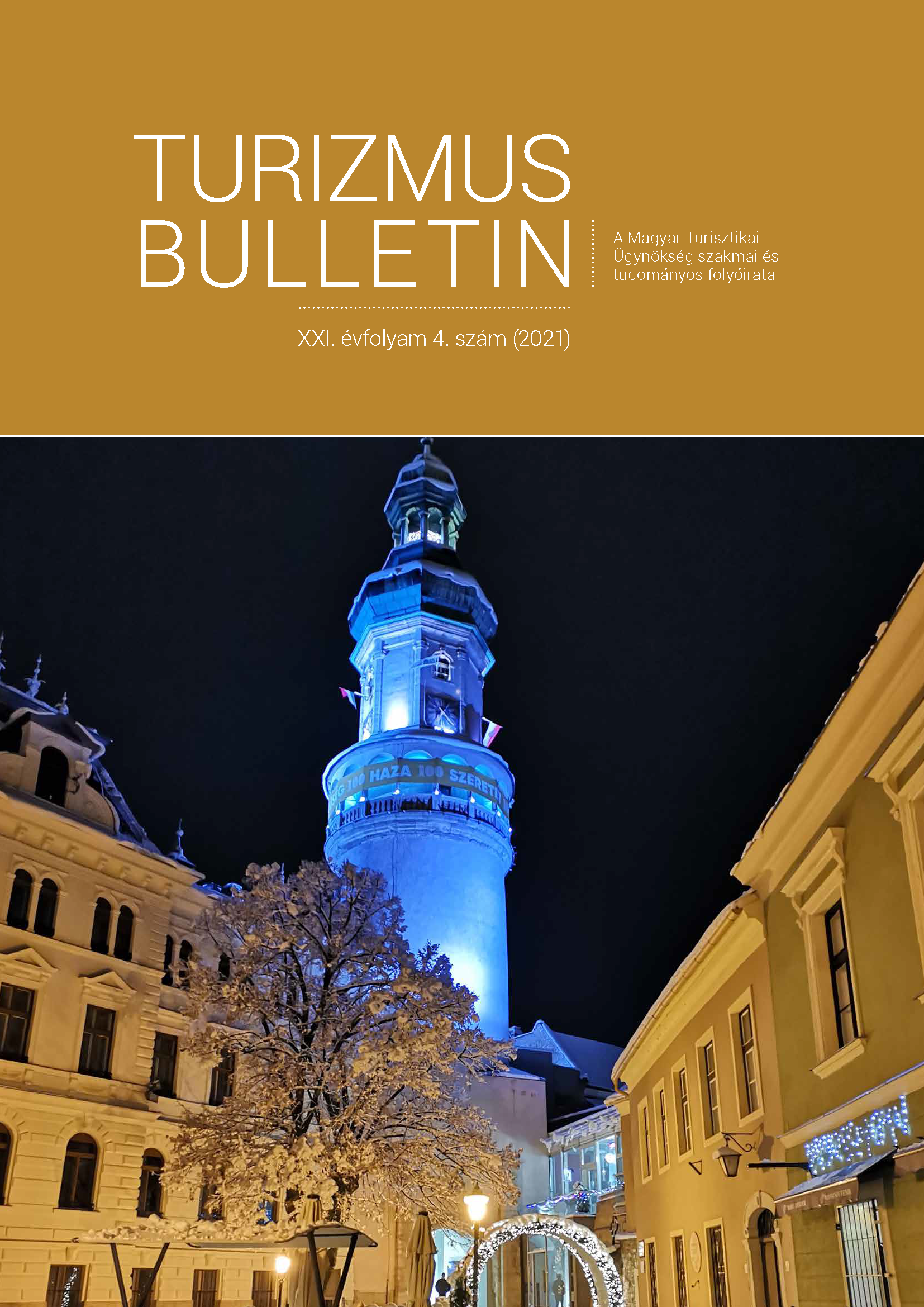A vendéglátás nemzetközi kutatási paradigmái a Covid19 árnyékában – Szisztematikus szakirodalmi áttekintés és egy koncepcionális keretmunka
DOI:
https://doi.org/10.14267/TURBULL.2021v21n4.1Kulcsszavak:
vendéglátás, reziliencia, válságmenedzsment, fenntarthatóságAbsztrakt
A koronavírus-járvány soha nem látott kihívás elé állította a turizmus-vendéglátás szereplőit világszerte. A válsághelyzettel való küzdelem a vállalkozások üzleti modelljének átalakítását, a vendégek kényszerű alkalmazkodását vonta maga után. A vendéglátásban tapasztalható jelenségekről számos cikk jelent meg a nemzetközi tudományos szakirodalomban. Jelen tanulmány célja egyrészt az aktuális ismeretelméleti megközelítések (vállalatelmélet, marketing, fogyasztói magatartás és szervezeti magatartás) rendszerezése, ami segíti a járvány vendéglátásra gyakorolt hatásának tudományos vizsgálatát, másrészt egy, a vendéglátó mikro- és kisvállalkozásokra irányuló kutatási keretmunka bemutatása olyan változók bevonásával, mint a tervezett és alkalmazkodó reziliencia, a pénzügyi teljesítmény, a fenntartható turizmusfejlődés és az állami segítségnyújtással való elégedettség.
Hivatkozások
BREWER, P. – SEBBY, A. G. (2021): The effect of on¬line restaurant menus on consumers’ purchase intentions during the COVID-19 pandemic. International Journal of Hospitality Management. 94 (April). https://doi.org/10.1016/j.ijhm.2020.102777
BUFQUIN, D. – PARK, J. Y. – BACK, R. M. – DE SOUZA MEIRA, J. V. – HIGHT, S. K. (2021): Employee work status, mental health, sub¬stance use, and career turnover intentions: An examination of restaurant employees during COVID-19. International Journal of Hospitality Management. 93 (February). https://doi.org/10.1016/j.ijhm.2020.102764
BYRD, K. – HER, E. S. – FAN, A. – ALMANZA, B. – LIU, Y. – LEITCH, S. (2021): Restaurants and COVID-19: What are consumers’ risk percep¬tions about restaurant food and its packaging during the pandemic? International Journal of Hospitality Management. 94 (April). https://doi.org/10.1016/j.ijhm.2020.102821
CAI, R. – LEUNG, X. Y. (2020): Mindset matters in purchasing online food deliveries during the pandemic: The application of construal lev¬el and regulatory focus theories. International Journal of Hospitality Management. 91 (October). https://doi.org/10.1016/j.ijhm.2020.102677
CHEN, H. – EYOUN, K. (2021): Do mindfulness and perceived organizational support work? Fear of COVID-19 on restaurant frontline employees’ job insecurity and emotional ex¬haustion. International Journal of Hospitality Management. 94 (April). https://doi.org/10.1016/j.ijhm.2020.102850
CHOI, S. – YANG, E. C. L. – TABARI, S. (2020): Solo dining in Chinese restaurants: A mixed-meth¬od study in Macao. International Journal of Hospitality Management. 90 (September). https://doi.org/10.1016/j.ijhm.2020.102628
CUTTER, S. L. – AHEARN, J. A. – AMADEI, B. – CRAWFORD, P. – EIDE, E. A. – GALLOWAY, G. E. – GOODCHILD, M. F. – KUNREUTHER, H. C. – LI-VOLLMER, M. – SCHOCH-SPANA, M. – SCRIMSHAW, S. C. – STANLEY, E. M. – WHITNEY, G. – ZOBACK, M. L. (2013): Disaster Resilience: A National Imperative. Environment: Science and Policy for Sustainable Development. 55(2). pp. 25–29. https://doi.org/10.1080/00139157.2013.768076
DE FREITAS, R. S. G. – STEDEFELDT, E. (2020): COVID-19 pandemic underlines the need to build resilience in commercial restaurants’ food safety. Food Research International. 136. (October). https://doi.org/10.1016/j.foodres.2020.109472
FOROUDI, P. – H. TABAGHDEHI, S. A. – MARVI, R. (2021): The gloom of the COVID-19 shock in the hospitality industry: A study of consumer risk perception and adaptive belief in the dark cloud of a pandemic. International Journal of Hospitality Management. 92 (January). https://doi.org/10.1016/j.ijhm.2020.102717
HINEK M. (2020): A turizmus közvetlen hozzá¬járulása a magyar gazdaság teljesítményéhez: a Turizmus Szatellit Számlák fejlesztésének alternatívái. Turizmus Bulletin. 20. Különszám. pp. 45–52. https://doi.org/10.14267/TURBULL.2020v20n4.0
KIM, J. – KIM, J. – WANG, Y. (2021): Uncertainty risks and strategic reaction of restaurant firms amid COVID-19: Evidence from China. International Journal of Hospitality Management. 92 (January). https://doi.org/10.1016/j.ijhm.2020.102752
KIM, J. – LEE, J. C. (2020): Effects of COVID-19 on preferences for private dining facilities in restaurants. Journal of Hospitality and Tourism Management. 45 (December) pp. 67–70. https://doi.org/10.1016/j.jhtm.2020.07.008
LEE, A. V. – VARGO, J. – SEVILLE, E. (2013): Developing a tool to measure and com¬pare organizations’ resilience. Natural Hazards Review. 14(1). pp. 29–41. https:// ascel ibrary.org/doi/abs/10.1061/%28AS-CE%29NH.1527-6996.0000075
LI, Y – YAO, J. – CHEN, J. (2021): The negative effect of scarcity cues on consumer purchase decisions in the hospitality industry during the COVID-19 pandemic. International Journal of Hospitality Management. 94. (April). https://doi.org/10.1016/j.ijhm.2020.102815
LINKOV, I. – TRUMP, B. D. (2019): The science and practice of resilience. Springer.
MADEIRA, A. – PALRÃO, T. – MENDES, A. S. (2021): The impact of pandemic crisis on the res¬taurant business. Sustainability. 13(1). pp. 1–13. https://dx.doi.org/10.3390/su13010040
MUN, S. G. – KOH, Y. – JANG, S. C. (2021): Which Type of M&A Makes an Acquiring Restaurant Firm a Star? Profit-Driven Versus Growth-Driven M&A. Cornell Hospitality Quarterly. https://doi.org/10.1177%2F1938965520979174
OU, J. – WONG, I. K. A. – HUANG, G. Q. I. (2021): The coevolutionary process of res¬taurant CSR in the time of mega disrup¬tion. International Journal of Hospitality Management. 92 (January). https://doi.org/10.1016/j.ijhm.2020.102684
PRAYAG, G. – CHOWDHURY, M. – SPECTOR, S. – ORCHISTON, C. (2018): Organizational resilience and financial performance. Annals of Tourism Research. 73. pp. 193–196. https://doi.org/10.1016/j.annals.2018.06.006
SHAPOVAL, V. – HÄGGLUND, P. – PIZAM, A. – ABRAHAM, V. – CARLBÄCK, M. – NYGREN, T. – SMITH, R. M. (2021): The COVID-19 pan¬demic effects on the hospitality industry us¬ing social systems theory: A multi-country comparison. International Journal of Hospitality Management. 94. https://doi.org/10.1016/j.ijhm.2020.102813
SOBAIH, A. E. E. – ELSHAER, I. – HASANEIN, A. M. – ABDELAZIZ, A. S. (2021): Responses to COVID-19: The role of performance in the relationship between small hospitality enter¬prises’ resilience and sustainable tourism de¬velopment. International Journal of Hospitality Management. 94 (April). https://doi.org/10.1016/j.ijhm.2020.102824
SONG, H. J. – YEON, J. – LEE, S. (2021): Impact of the COVID-19 pandemic: Evidence from the U.S. restaurant industry. International Journal of Hospitality Management. 92 (January). https://doi.org/10.1016/j.ijhm.2020.102702
TAYLOR, S. (2020). The socially distant services¬cape: An investigation of consumer preference’s during the re-opening phase. International Journal of Hospitality Management. 91 (October). https://doi.org/10.1016/j.ijhm.2020.102692
Internetes források
KSH (2021): A vendéglátóhelyek forgalma és volumene. https://www.ksh.hu/docs/hun/xstadat/xstadat_ evkozi/e_oga016.html, Letöltve: 2021. május 19.
NEMZETI CÉGTÁR (2021): Interaktív grafikon. https://nemzeticegtar.hu/interaktiv-grafikon, Letöltve: 2021. május 19.
STATISTA (2020a): Global tourism industry – sta¬tistics & facts. https://www.statista.com/top-ics/962/global-tourism/#dossierSummary, Letöltve: 2021. május 19.
STATISTA (2020b): Leisure tourism spending world¬wide from 2000 to 2020. https://www.statista. com/statistics/1093335/leisure-travel-spend¬ing-worldwide/, Letöltve: 2021. május 19.
STATISTA (2020c): Business tourism spending world¬wide from 2000 to 2020. https://www.statista. com/statistics/1093295/business-travel-spend¬ing-worldwide/, Letöltve: 2021. május 19.
WHO (2004): https://www.who.int/mental_ health/evidence/en/promoting_mhh.pdf, Letöltve: 2021. május 19.

